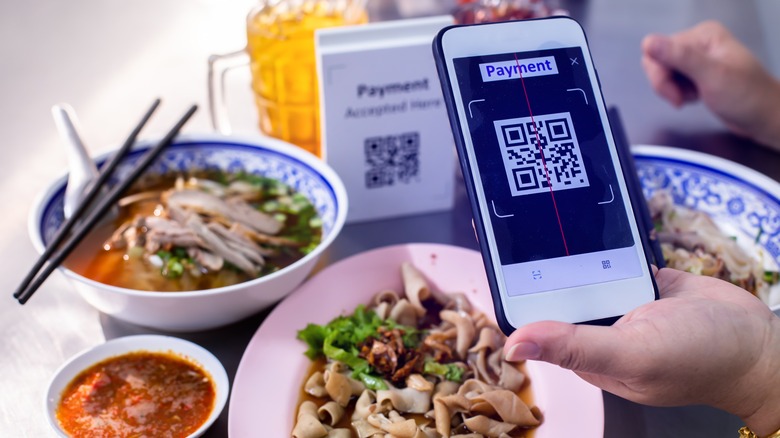The Real Reason Tourists Should Never Offer To 'Split The Check' At A Restaurant In China
Picture this: You're enjoying a peaceful dinner at a restaurant in Beijing when, all of a sudden, at the table next to you, two well-dressed businessmen leap from their chairs and begin wrestling over a small leather folder. No, this isn't the start of a brawl — it's actually a pretty common sight at most local Chinese restaurants. Because, despite what might initially seem like total chaos, diners in China are actually known to engage in some pretty heated (but generally friendly) post-meal battles over who gets the honor of paying the bill.
Now, you might be thinking: "Why not just split the bill and be done with it?". After all, it's the easiest thing to do after grabbing food or drinks with friends in the U.S.; everyone pays for whatever they drank or ate, or the bill is evenly split to avoid any confusion (or tableside math). However, one of the most important things to know before traveling to China is that the concept of "going Dutch" or splitting the check isn't really a social norm at all.
In fact, splitting the bill is often highlighted as something you should never do when visiting China — especially considering that the idea goes against strongly held social customs. So much so that if you ever find yourself dining alongside locals, even the mere suggestion of dividing the bill (aka, "AA制" or "AA zhi") will be considered poor etiquette — and everyone at the table will immediately label you as being cheap and stingy.
Paying the bill is considered an honor in China
The tradition of "fighting" to pay the check runs much deeper than simple generosity. Beyond just mindlessly picking up the tab, the gesture is actually deeply woven into the fabric of Chinese social relationships, where treating others to a meal helps build and maintain important connections. In China, meals out are often seen as opportunities to treat others, strengthen friendships, and show appreciation — and the simple act of paying for somebody's food symbolizes all of that. With that in mind, a great phrase to learn before traveling to China is "mǎi dān" ("买单"), which essentially means "check please" or "pay the bill." That way, you can show the people around you that you genuinely care about following local customs and are happy to foot the bill on this occasion.
However, it's worth noting that there are various social rules that dictate who pays, when they pay, and what's expected in certain situations. For example, if you're visiting someone from out of town, attending a thank-you dinner, or joining a new group as an outsider, you can relax and put your wallet away, as you probably won't be expected to pay this time around. The same goes for people who earn less at the table or anyone who's received an explicit dinner invitation. Lastly, and as for reciprocity, don't think that the entire experience is one-sided. If someone does treat you to a meal, there's an unspoken expectation that you'll be the one to reciprocate next time. Otherwise, you might get labeled an "iron rooster": someone so stingy they wouldn't pluck out a single feather to pay for things.

